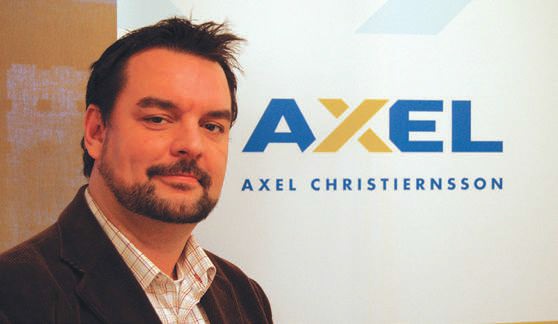20 Minutes With Constantin Madius
Rachel Fowler, Managing Editor | TLT 20 Minutes June 2017
With one foot in the U.S. and the other in Europe, this product specialist discusses competitive cooperation, grease technology and the future of REACh.

CONSTANTIN MADIUS - The Quick File
Constantin Madius has worked at Axel Christiernsson since 1998, first as a technical service and product engineer, then as sales account manager and as group product manager for Axel Christiernsson International. In 2013 he moved to the U.S., taking up the position as commercial product manager for AXEL Americas LLC. Madius also has been responsible for customer training courses and lubrication seminars resulting in the exclusive Grease Genius program offered to AXEL’s customers. He has lectured on these topics at universities and postgraduate education institutes within the Nordic countries and is the co-author of the book Grease Fundamentals. Madius also is the technical coordinator for the European Lubricating Grease Institute (ELGI). He received his bachelor’s of science in chemical engineering from the University College in Borås, Sweden.
AXEL Americas LLC is one of the leading suppliers of lubricating greases in the U.S. market and a part of the AXEL Christiernsson Group. During the last 10 years, AXEL has expanded dramatically to become one of the leading global producers and suppliers of lubricating greases with state-of-the-art ISO-certified manufacturing facilities in Sweden, France, the Netherlands and the U.S. AXEL works successfully with many of the leading lubricants companies around the world. The company’s commitment to the customized label concept means that it has no brands of its own and does not compete with its customers.

Constantin Madius
TLT: You have worked in the lubricants industry in Europe and are now in North America. What do you see as the main differences between doing business on the two continents?
Madius: Both Europe and North America have their own unique challenges. At first glance you would think that the markets are fairly similar, but a deeper analysis will show you otherwise. For one, the business culture is completely different. In Europe there are different business cultures depending on the country, and there might even be language barriers that need to be overcome. In that aspect it is simpler in North America. Here it is usually more company dependent, which is not really unique for the region.
Performance preferences differ as well. Globally we have for quite some time seen the trend to switch from lithium grease to lithium complex, mainly pushed by the need for increased performance in automotive and industrial application. The benefits with lithium complex is an increased shear stability and an increased thermal stability leading to a longer life of the product in demanding applications. The North American region is unique in the aspect of being the only region where lithium complexes are used to a higher extent than simple lithium greases. Other grease technologies such as calcium sulfonate complex and polyurea also are more widely used in North America, even if we see these thickeners steadily increasing in Europe.
Another fascinating aspect is seeing how similar application challenges have been solved with different grease technologies in North America and Europe and how they have eventually evolved to be more or less standard solutions. One good example is lubrication of electrical motor bearings, an application where low friction and long life is preferable. In North America there seems to be a preference for using polyurea-thickened grease, whereas in Europe a synthetic lithium complex. Both, if formulated correctly, are really good solutions. Just completely different.
TLT: REACh clearly has an influence on the current and future business in Europe and also affects non-Europeans selling in Europe. How has AXEL responded to the challenges presented by REACh?
Madius: In this case we have been fortunate to have our headquarters located in Europe. AXEL was one of the initiators of the European REACh Grease Thickener Consortium and has been an active member ever since. Our focus has been to register all the grease thickeners that we produce in Europe and also to register the specific thickener technologies only produced by AXEL Americas. We have during this time proactively worked with our suppliers to ensure that they have started the REACh registration work concerning the raw material that we source.
Since AXEL has three grease manufacturing companies in Europe, most of the thickeners are covered. For the specific greases only produced by AXEL Americas, such as polyureas, our sister companies act as only representatives, which enables us to export to the European market.
TLT: Thinking further about REACh, do you think everything will stabilize after 2018 or is there more change afoot?
Madius: This is a complicated question. I believe that it will stabilize in Europe, but we already see that REACh is spreading to other geographical areas such as China. Other regions and countries are using and adapting the REACh legislation to fit their specific area. This will probably continue in the wake of an increased global concern about chemicals and their effects.
At the same time we will probably see a decrease in the accessibility of specialized additives. Many smaller or niched additive suppliers might decide not to register their products due to the high cost involved in the registration. This will, in turn, have an effect on grease development, especially when it comes to customized solutions making these products inaccessible for the European market and markets with similar legislation.
TLT: You’re the technical coordinator of ELGI. What are the organization’s main technical goals?
Madius: The technical coordinator is responsible for the ELGI working groups (
see Figure 1). There are currently five active working groups, and three of them are joint groups with NLGI. These groups are either established by the initiative of the technical coordinator and the board or by the initiative of ELGI members.
 Figure 1. There has been a steady increase of unique attendees to the ELGI working groups during the last couple of years, and it is expected to continue in Helsinki, Finland, in 2017.
Figure 1. There has been a steady increase of unique attendees to the ELGI working groups during the last couple of years, and it is expected to continue in Helsinki, Finland, in 2017.
•
The Joint Grease Particle Evaluation working group is in the process of proposing a new standard for particle count and evaluation.
•
The Joint Food Grade Lubricants working group issued a position paper at the beginning of last year regarding The Selection and Usage of Food Safe Lubricants.
•
The Joint Biobased Greases working group is evaluating testing methodology on oxidation suitable for biobased products.
•
The Railway Lubricants working group is working closely with European industrial bodies and end-users to propose a new standard for top-of-rail lubricants.
•
The Test Methods and Rheology working group is working closely with ISO and DIN in Europe and also with ASTM to propose new and harmonized testing methods.
Each group has at least two meetings per year, one at the ELGI AGM in the spring and one at the ELGI Forum in the fall.
 Cone penetration, ASTM D271, is the most common test done on greases. Cone penetration determines the consistency of the grease, which is then converted into the NLGI grade.
Cone penetration, ASTM D271, is the most common test done on greases. Cone penetration determines the consistency of the grease, which is then converted into the NLGI grade.
The role of the technical coordinator is to facilitate the work and support members who are interested in starting new working groups. Needless to say, you find yourself active in all the groups, not just as the coordinator but as a contributing member.
The interest for the working groups has increased in the last couple of years to having just shy of 100 unique attendees at the meeting in Venice, Italy, last year.
 Water resistance, DIN 51807/1. Water is one of the hardest contaminants that grease has to deal with. To effectively determine the water resistance of a grease, tests are started in the laboratory to then be proven in field trials.
TLT: How do you foster cooperation between people who are working for competitive companies?
Madius:
Water resistance, DIN 51807/1. Water is one of the hardest contaminants that grease has to deal with. To effectively determine the water resistance of a grease, tests are started in the laboratory to then be proven in field trials.
TLT: How do you foster cooperation between people who are working for competitive companies?
Madius: Cooperation between competitive companies is always a sensitive issue. Nevertheless, when looking at the lubricating grease industry, which is a small part of the lubricants industry, I see a small community where there is a great deal of respect for the colleagues. Most of us know or know of each other.
I believe that everyone gains from increased technical cooperation. That is why I think the ELGI working groups are so popular. OEMs and end-users are continuously improving their equipment and solutions and, unfortunately, we as grease developers are not always invited to the table. It is important for us to really understand the new requirements to be able to support the final goals. There is no point developing a low-friction bearing solution if the same old high-friction grease is used.
A technical cooperation does not mean that you need to reveal your intellectual property, but it does give you a platform to discuss specific issues and learn from other’s experiences. How we then tackle these challenges are based on the strategy, knowledge and experience within our own company. In some cases we might come to similar solutions and in others not. Just look at how the grease industry in North America and Europe have evolved in somewhat different directions.
 Grease comes in many colors. The color of the product does not give you any information about the performance. Be sure to read the technical data sheet and choose products based on performance rather than looks.
TLT: Do you see the main purpose of trade organizations to be networking, education or maybe something else?
Madius:
Grease comes in many colors. The color of the product does not give you any information about the performance. Be sure to read the technical data sheet and choose products based on performance rather than looks.
TLT: Do you see the main purpose of trade organizations to be networking, education or maybe something else?
Madius: The networking is a very important part. At the end of the day making business is, for many of us, our license to operate. But with that said I would personally still choose education as the most important part, especially within the grease industry.
We in the industry have in the past portrayed the knowledge of grease manufacturing as an art rather than a science. We have even portrayed ourselves as magicians standing in front of a cauldron. Even if this has been done with a large portion of humor, I think most marketers and end-users still consider lubricating grease something reserved for the few truly initiated. This is far from the truth.
I have spent many years lecturing and teaching about greases, the different technologies and grease applications—trying to make simple and understandable what people usually perceive as complicated, and there is a definite need for more education and training courses not only for raw material suppliers and grease marketers but also for maintenance personnel and equipment designers.
I see education as being the key to success and also the foundation for developing your area of responsibility no matter if it is sales, maintenance or design. Because at the end of the day, we want the grease selections to be based on the performance requirements needed for the specific application rather than tradition or color, and this can only be achieved with knowledge.
You can reach Constantin Madius at constantin.madius@axelch.com.